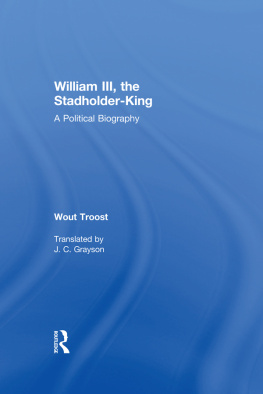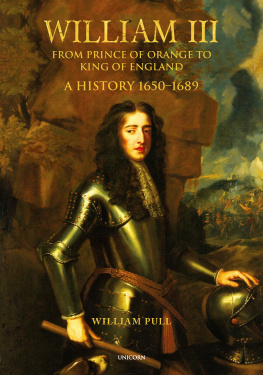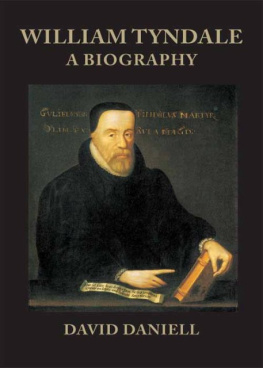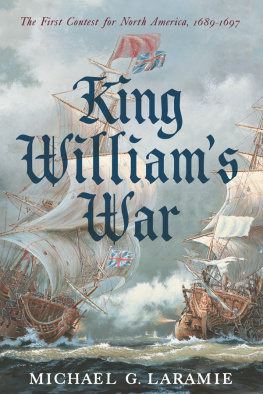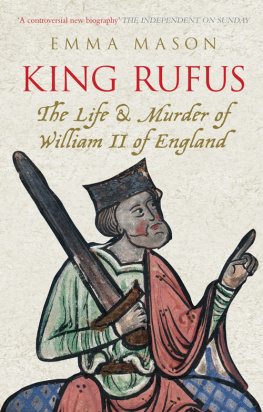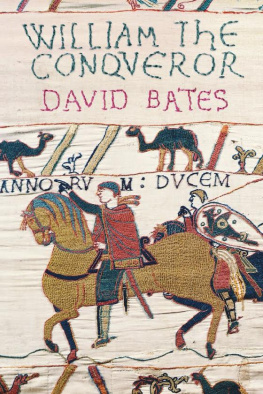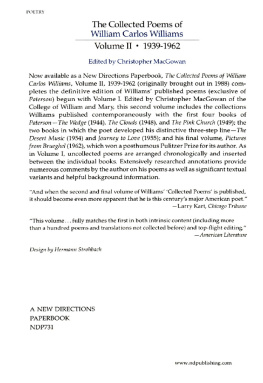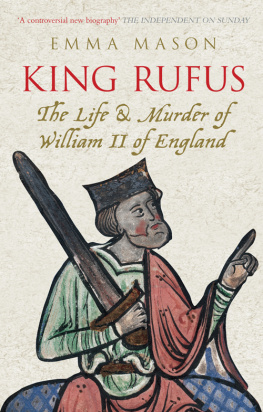First published 2005 by Ashgate Publishing
Published 2016 by Routledge
2 Park Square, Milton Park, Abingdon, Oxon OX14 4RN
711 Third Avenue, New York, NY 10017, USA
Routledge is an imprint of the Taylor & Francis Group, an informa business
Copyright 2005 Wout Troost
Wout Troost has asserted his moral right under the Copyright, Designs and Patents Act, 1988, to be identified as the author of this work.
All rights reserved. No part of this book may be reprinted or reproduced or utilised in any form or by any electronic, mechanical, or other means, now known or hereafter invented, including photocopying and recording, or in any information storage or retrieval system, without permission in writing from the publishers.
Notice:
Product or corporate names may be trademarks or registered trademarks, and are used only for identification and explanation without intent to infringe.
British Library Cataloguing in Publication Data
Troost, Wout,
William III, the Stadholder-King: A Political Biography
1. William III, King of England, 16501702. 2. Stadholders Biography.
3. Great Britain Kings and rulers Biography. 4. Netherlands History
16481714. 5. Great Britain History William and Mary, 16891702.
941.068092
US Library of Congress Cataloging in Publication Data
Troost, Wouter,
[Stadhouder-koning Willem III. English]
William III, the Stadholder-King: A Political Biography / by Wout Troost;
translated by J.C. Grayson.
p. cm.
Includes bibliographical references and index.
1. William III, King of England, 16501702. 2. Great Britain History
William and Mary, 16891702. 3. Great Britain Kings and rulers
Biography. 4. Netherlands Kings and rules Biography. 5. Netherlands
History 16481714. I. Title.
DA462.A2T76 2004
941.068092dc22
2004016873
ISBN 9780754650713 (hbk)
Typeset by Bournemouth Colour Press, Parkstone, Poole.

There are few good Dutch biographies of William III. The two-volume standard work by N. Japikse suggests the book is more of a hagiography than a scholarly biography of the Stadholder-King.
Biographies of William III in English are equally scarce. Following a rather superficial study by G. J. Renier, former professor of Dutch history at the University of London, attributed this exaggerated sympathy to Baxters views on the Vietnam war. Baxter had political links with the conservative Republican Barry Goldwater, and supported his proposal to bomb North Vietnam. In his eyes Louis XIV was Ho Chi Minh and William III the good American.
The lack of biographies of William III is easily explained. The Princes aloof and reserved personality has little to attract the imagination. And the historian must not only be familiar with the history of the Dutch Republic, but also sufficiently versed in English, French and German history. It is therefore hardly surprising that J. G. Kikkert did not follow his biographies of William I, Maurice and Frederick Henry with a life of William III. And the English historian John Miller, well known for his excellent biographies of James II and Charles II, once admitted to me that it had never occurred to him to write a life of their nephew.
fundamentally changed the way in which historians wrote about the domestic politics of the Dutch Republic in the seventeenth century. His argument, that politics in the Republic were determined far more by conflicts between local factions than those between Orangist and States parties, has left clear traces in every historical work on the Republic written since it first appeared in 1962. His deep knowledge of the period ought to have led to a new book on William III in time for the commemoration of the Glorious Revolution in 1988, but his early death in 1983, just before I was awarded my Ph.D., prevented this.
This study of William III devotes much attention to the domestic policy of the Stadholder-King. In the first chapter, particularly the section on Orangist and States parties, I try to introduce the reader to the concepts of party and faction. , The Task and the Tools, shows how William attempted to harness the administrative apparatus of the Republic to accomplish the task he set himself, to curb the power of Louis XIV.
Most historians have apparently found it very difficult to describe the struggle between William and Louis objectively. For most of them, the biblical saying, he who is not with me is against me, holds true: they have been for William III or against him. My own background ensured that for a long time I remained in the pro-William camp. The works of such Anglo-Saxon historians as Mark Thomson, nevertheless convinced me that such a one-sided view was no longer tenable. Andrew Losskys argument that William III and Louis XIV misunderstood each other and were trapped in their negative mutual images seems to me at present to be the most persuasive interpretation of the conflict between the two rulers. It allows a different perspective on the relationship of the two kings, which breaks away from the traditional lines taken by their opponents and champions.
This study also devotes a great deal of attention to Williams relationship with England. Japikses two volume biography pays far too little attention to William as King of England. His birth as son of Mary Stuart I made him an English prince. Before he became Stadholder of five of the provinces in 1672 he attempt to show the reader that William III was king not only of England but of Scotland and Ireland also.
Tony Claydons William III appeared a year after the first publication of my biography. It is a less narrative account than mine, and its central concern is to analyse the English kingship of William III. The authors view is that the English have never paid William the honour he deserves, and that the reason for this was the Stadholder-Kings un-British character.
Yet that Dutch background, which Claydon calls his Orange character, was the basis of Williams success in England. Whereas his English uncles Charles II and James II had failed to build a good relationship with the political nation, the Dutch prince, despite the struggle over his constitutional position and his often difficult relations with the political parties, nevertheless managed to forge a working partnership with Parliament. His experience in dealing with Dutch politicians, above all those in Holland and Amsterdam, ensured that he was prepared to give and take in English politics. His lifes work, the restraint of France, which brought him to England in 1688 and for which he needed money from Parliament, meant that he was always willing to compromise with the English politicians. That gave English politics stability.
In , The Task and the Tools, Williams life work and the way in which he used his contacts with Dutch politicians to realize it are discussed in detail. Claydons conclusion that the political experience he acquired in the Republic and his continental ambitions enabled William to conduct a policy of consensus with Parliament, in spite of all the difficulties, is original and at the same time wholly convincing.
Throughout the text, passages in foreign languages have been translated into modern English, and those in English have been left in the original. It is generally known that the British Isles in the seventeenth century followed a different calendar from most of the continental countries. English, Scottish and Irish dates have been given in the old style; for events that were important for both England and Europe I have given dates in both old and new styles.
I have particularly appreciated the interest shown in my work by Professor Groenveld. I also wish to thank him cordially for his remarks and suggestions, and for his assistance in the final phase of writing this biography.

